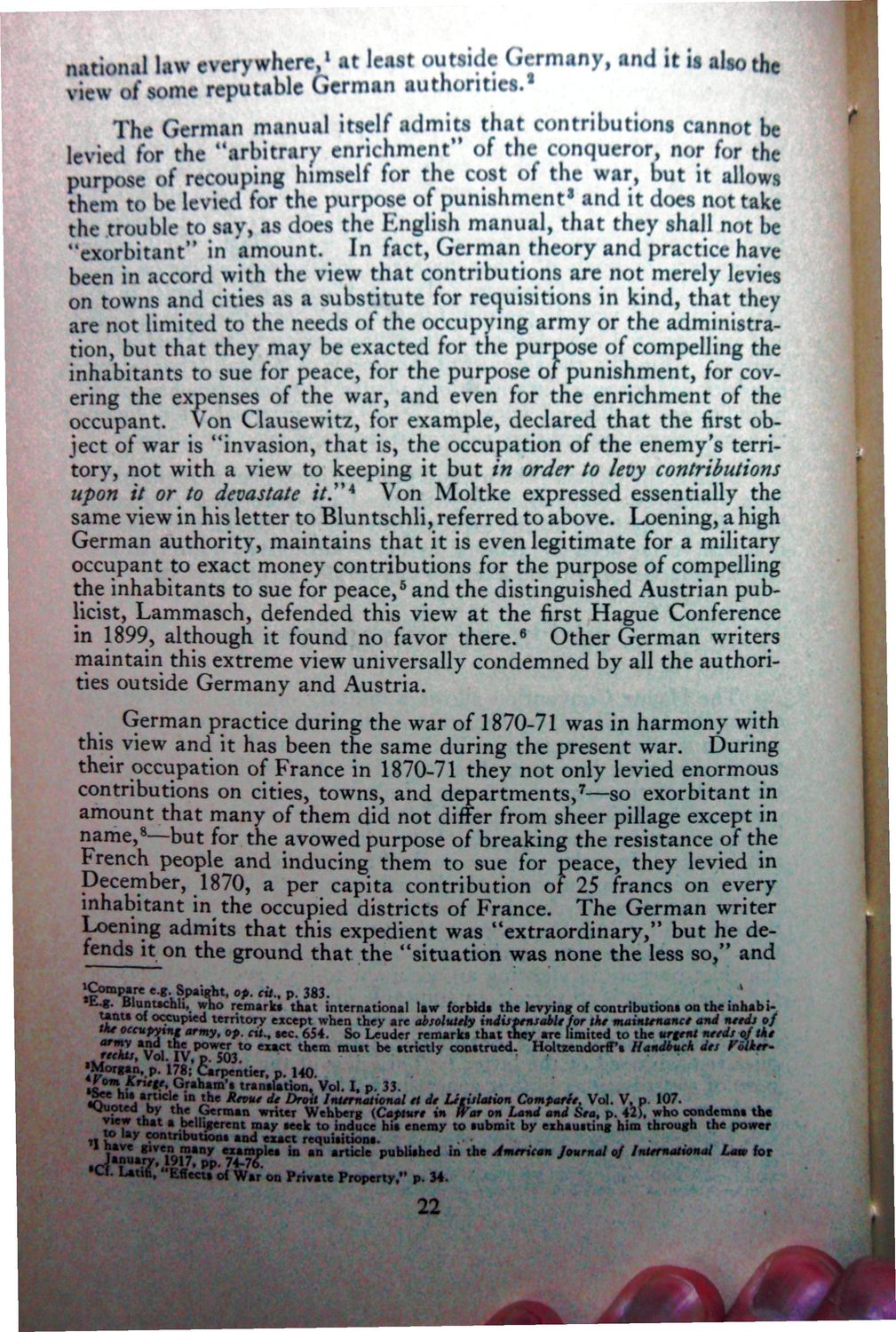| |
| |
Caption: War Publications - WWI Compilation 1923 - Article 14
This is a reduced-resolution page image for fast online browsing.

EXTRACTED TEXT FROM PAGE:
national law everywhere, at least outside Germany, and it is alio rman authorities • II view of The German manual itself admits that contributions cannot he 0 levied for the "arbitrary enrichment of the conqueror, nor for the purpose of recouping himself for the cost of the war, but it allows 1 them to be levied for the purpose of punishment and it does not take the trouble to say, as does the English manual, that they shall not be 0 "exorbitant in amount. In fact, German theory and practice have been in accord with the view that contributions are not merely levies on towns and cities as a substitute for requisitions in kind, that they are not limited to the needs of the occupying army or the administration, but that they may be exacted for the purpose of compelling the inhabitants to sue for peace, for the purpose of punishment, for covering the expenses of the war, and even for the enrichment of the occupant. Von Clausewitz, for example, declared that the first object of war is "invasion, that is, the occupation of the enemy's territory, not with a view to keeping it but in order to levy contributions A upon it or to devastate it" Von Moltke expressed essentially the same view in his letter to Bluntschli, referred to above. Loening, a high German authority, maintains that it is even legitimate for a military occupant to exact money contributions for the purpose of compelling 6 the inhabitants to sue for peace, and the distinguished Austrian publicist, Lammasch, defended this view at the first Hague Conference 6 in 1899, although it found no favor there. Other German writers maintain this extreme view universally condemned by all the authorities outside Germany and Austria. German practice during the war of 1870-71 was in harmony with this view and it has been the same during the present war. During their occupation of France in 1870-71 they not only levied enormous 7 contributions on cities, towns, and departments, —so exorbitant in amount that many of them did not differ from sheer pillage except in 8 name, —but for the avowed purpose of breaking the resistance of the French people and inducing them to sue for peace, they levied in December, 1870, a per capita contribution of 25 francs on every inhabitant in the occupied districts of France. The German writer Loening admits that this expedient was "extraordinary," but he defends it on the ground that the "situation was none the less so," and \9T i!1>1 ••l-Spaight, op.cit., p. 383. t chl1 who p t 1 t JJP * *. remarks that international law forbids the levying of contributions on the inhabitant* of occupied territory except when they are absolutely indispensable for the maintenance and needs of iiu occupying army, op. cit., tec. 654. So Leuder remarks that they are limited to the urgent needs of the n ?"?? \ r i «J« Power to exact them must be strictly construed. Holtzendorrs Handbuch des Vblker'"*", Vol. IV, p. 503. •Morgan, p . 178; Carpentier, p. 140. G rah KJ W a ''.'\l e . n »™ R• translation. Vol. I, p. 33. t,c hc •n .A £ « * <™< de Droit International et de Legislation Comparee, Vol. V. p. 107. njupted by the German writer Wehberg (Capture in War on Land and Sea, p. 42), who condemns the view that a belligerent may seek to induce his enemy to submit by exhausting him through the power to lay contributions and exact requisitions. I have given many examples in an article published in the American Journal of International Lam for nu V / . , } ^ 7 . pp. 74-76. irJ* • U . Latin, "Effects of War on Private Property," p. 34. 22
| |